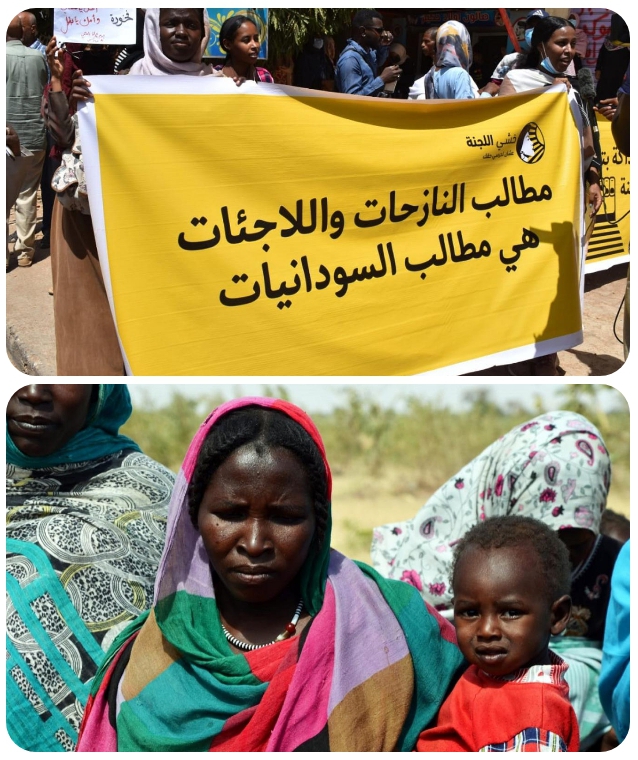
Since the outbreak of armed conflict between the army and the Rapid Support Forces (RSF) in mid-April 2023 in the capital, Khartoum, and its geographical expansion to other states, Sudanese women and girls—who form the backbone of society—have paid a heavy price, facing multiple forms of grave violations. They endured indiscriminate shelling between the warring parties, witnessed destruction, death, looting, forced displacement, and experienced rape, the ugliest face of this war.
This painful reality in Sudan has left many women with severe psychological trauma, including depression, anxiety, fear, despair, insomnia, and even suicide. So, what is the current situation for Sudanese women, and how are they managing life under these overwhelming circumstances?
Siege and Violations
Sudanese citizen Arfa Issa recounts her escape from the city of El Fasher, the capital of North Darfur State, fearing violence. She said, “We stayed in El Fasher since the fighting began, even as it raged through residential neighborhoods. We tried to live with the sound of gunfire, but in recent days, life became impossible due to the severe shortages of food and medicine caused by a siege lasting more than ten months, in addition to aerial and artillery targeting of civilians.”
She added, “This dire situation forced me to flee with my four children in search of safety and food. I couldn’t meet even the most basic needs due to skyrocketing prices, especially since we had no breadwinner after my husband was killed by a stray bullet during clashes near our home. Even getting water was difficult, only available through donkey carts, with a barrel costing about 12,000 Sudanese pounds (approximately $20).”
She continued, “The displacement journey took three days, traveling long distances on foot and in rundown vehicles until we reached El Obeid, the capital of North Kordofan, 528 kilometers from El Fasher. But the horror of the violations, killings, and destruction worsened my mental state day by day. My children are now fatherless, and I alone must bear full responsibility for them. They are also psychologically affected after witnessing their father bleeding to death. I don’t know how they will ever forget that painful and heartbreaking scene.”
She concluded, “I’ll try to find work once we settle here so I can provide for my children’s needs—food, education, and healthcare. But there’s no doubt that life is not easy, especially when you’re trying to settle in a city you’ve never been to before.”
Ongoing Consequences
Activist and human rights advocate Nimat Koko said, “This war has caused the largest humanitarian crisis in recent history. Its prolonged duration has worsened its impact, especially on Sudanese women and girls who have endured numerous forms of suffering and psychological trauma. The constant fear, anxiety, and tension are a result of sexual violence, abduction, slavery, and the use of their bodies as weapons of war.
These crises have devastated women—some wounded by shell fragments, others whose homes were destroyed and looted, which has left a deep psychological toll. Many are also now the sole providers for their children while living in displacement, facing an uncertain future.”
She added, “The war has caused major economic losses for women, including job loss and lack of income sources, forcing many to seek aid. The biggest losses have occurred in rural areas, where women work in farming, herding, and crafts—crucial roles in food security, contributing up to 80% of agricultural production. With the collapse of the agricultural sector, they now face famine.”
Koko continued, “As the conflict spreads through Darfur and Kordofan and into northern cities targeted by RSF suicide drones, violations could be repeated in any area of active fighting. Rape, in particular, has long-lasting psychological effects and has driven some survivors or their family members to suicide or murder. This level of trauma requires psychological treatment and long-term care.”
Urgent Need for Mental Health Services
Mental health specialist Asmaa Mohamed Juma stated, “The war has scorched women and girls, causing violations that have led to a sharp rise in mental disorders. These women have endured horrific atrocities that blatantly violated their rights, especially by the RSF. They suffer from trauma, compounded by the loss of privacy in displacement camps, gang rape, verbal harassment, unwanted pregnancies, and legal inaction.”
She added, “Women and girls have faced widespread suffering, especially minors who were married off to RSF members in exchange for money, with families unable to refuse. Some women witnessed their husbands or sons being executed in front of them—trauma that undoubtedly causes severe psychological disorders.”
Juma urged the removal of obstacles preventing the return and reintegration of displaced people in newly liberated areas and called for the activation of mental health clinics. “Displaced people, in general, endured severe conditions, and they need social and economic support through small business initiatives.”
Lack of Protection
Meanwhile, Nimat Abu Bakr, Sudan Program Coordinator for the Strategic Initiative for Women in the Horn of Africa (SIHA), stated, “Sudanese women have experienced extremely complex tragedies due to this war—particularly in displacement, homelessness, and increasing sexual violence.”
She added, “With the conflict expanding, women and girls have endured escalating violations, especially rape, one of the most heinous crimes in war. Many victims are still unable to move past it, particularly young girls. There has also been a rise in the number of forcibly disappeared women and girls. In areas controlled by the RSF, they were subjected to exploitation and sexual slavery, severely impacting their physical and mental health.”
Abu Bakr emphasized that “protecting women has become a fundamental issue that all advocacy organizations must rally around. Women are in dire need of intervention, especially as protection organizations are largely absent during this crisis.”




